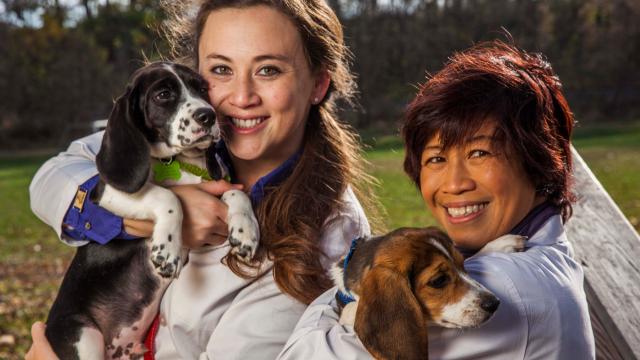In vitro fertilisation for humans has been around since the late 1970s, but the same can’t be said for our canine companions. But now, after decades of research, scientists have finally produced the first live, healthy puppies from frozen embryos.
The seven healthy puppies, brought to life by a team of researchers from the Smithsonian Conservation Biology Institute (SCBI) and Cornell University, were created from the genetic material of beagles, Labrador retrievers, and cocker spaniels. Just a few months old, the puppies have so far exhibited normal behaviour and growth. The details of this groundbreaking project, headed by SCBI researcher Jennifer Nagashima, can now be found in the open access science journal, PLOS One.
It hasn’t been easy to develop assisted reproductive technologies for dogs, owing to their unique and challenging reproductive physiologies. Domesticated dogs ovulate only about once or twice a year. And unlike many other mammals, they release immature eggs during ovulation instead of the mature eggs required for successful IVF.
To help things along, the researchers bolstered the ability of canine sperm to fertilise an egg by adding magnesium to the sperm’s storage medium. They also discovered that IVF works best when the eggs reached maturity on the sixth day.
The researchers say their technique could be used by conservationists to preserve endangered canid species, such as maned wolves and dhole.
“The seven healthy puppies born as a result of this work represent hope for their endangered counterparts,” noted study co-author Nucharin Songsasen in a release. “At SCBI, we collect and freeze ovarian tissue and sperm when genetically valuable individuals die. Now we are one step closer to applying in vitro technologies to endangered canids, which should ensure their survival even while the populations continue to decline in the wild.”
This technique, when used alongside gene-editing technology, could also be used to eliminate heritable diseases in susceptible canids, including domesticated dogs.
Read the entire study at PLOS One.
